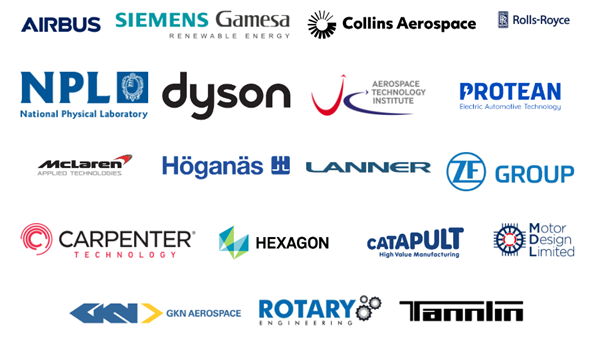Future Electrical Machines Manufacturing Hub
Addressing key manufacturing challenges in the production of high integrity and high value electrical machines for the aerospace, energy, high value automotive and premium consumer sectors.
Contact our teamThe Future Eledctrical Machines Manufacturing (FEMM) hub is a 7-year, EPSRC funding projects researching the design and manufacture of high value electrical machines. The hub is addressing key manufacturing challenges in the production of these high integrity and high value electrical machines in sectors including aerospace, energy, high value automotive, and premier consumer goods.
Electrical machines design has arguably been limited by traditional manufacturing techniques, which in turn reinforces the stasis in design and reticence of manufactures to consider alternatives. In work package 1.1 we will focus on harnessing emerging and innovative manufacturing methods to realise alternative machine topologies and to demonstrate how performance, efficiency and material utilisation can all be improved if new techniques and processes are adopted.
Led by Newcastle University
This work-package aims to develop and evaluate manufacturing methods for embedding high reliability sensor system into electrical machines leading to the realisation of a step-change in the functionality and robustness of in-service monitoring systems. Routine conditioning monitoring of industrial electric machines is well-established in sectors such as in off-shore oil and gas industry where the additional costs are warranted. With the adoption of electrical machines in evermore safety critical applications - the aerospace sector in particular - there is a growing interest and research activity in innovative and robust methods for reliably monitoring the real-time health status of electrical machines with very dynamic operating cycles and rapidly changing operating environments.
Led by the University of Sheffield
The overwhelming majority of electrical machines research is directed towards the electromagnetically active elements, such as the magnets or coils. However, in terms of the overall power density, the non-active elements, namely the rotor hub/shaft and the stator casing can contribute a significant proportion of the overall mass.
This grand challenge will explore a number of alternative materials, processes, and geometries to lightweight the various structural components encountered in a range of electrical machines. We will also be investigating the possibility to integrate additional functionality into the structural components with features such as cooling ducts in casings and end-caps, and self-pumping elements in hollow shafts and hubs.
Led by NMIS
Exciting developments over the past few years have included the design of traditional electrical machines for use in cryogenic environments- mainly for use in hydrogen powered aircraft- and the further development of fully superconducting machines. Both technologies are developing rapidly, but the manufacturing technologies that will be required for each- especially when larger volumes will be required- are still unclear. One of the aims of GC1.4 is to assess the current state-of-the-art in design and material selection for low temperature applications, and link this to the manufacturing research that is already ongoing within the FEMM hub.
Led by NMIS
The sheet materials used for electrical machine cores have magnetic properties that exhibit varying degree of sensitivity to the processes involved in the manufacture of a complete stator core from the starting sheets, notably the cutting of the lamination profile, the formation of a stack and the fitting of the stack into a casing. As a result, there is a general acceptance of some loss in performance of the core material, and hence some loss in overall performance in the final machine. This project will develop, principally through extensive experimental measurements on a range of materials, a comprehensive understanding of the various phenomena in play. This understanding will provide a basis for both developing new or variations on manufacturing processes and providing a well-founded methodology for accounting for manufacturing induced degradation of core properties.
Led by the University of Sheffield
This work-package is focussed on advanced coil manufacturing techniques, in particular those which have the potential to realise high performance coils though a combination of innovation in conductor configurations and their manufacture with precision and repeatability. This work-package links closely with GC2.3 and GCX2, which are concerned with flexible automation and in-process monitoring respectively.
Led by the University of Sheffield
Current production of electrical machines occupies two extremes of scale: the ubiquitous low-cost, mass-produced machines that can be found from consumer goods to automotive and industrial automation; and bespoke and highly specialised machines, which do not lend themselves to automation, and thus are costly to produce. However, it is proposed that this gulf between mass-produced machines and bespoke machines, illustrated in Figure 1, can be bridged by imbuing manufacturing systems with greater intelligence to allow flexible manufacture of more product variants. This flexible automated production would have the benefit of reducing manufacturing costs whilst also improving on quality, thereby allowing manufacturers to capitalise on the increasing demand with the drive towards electrification to meet the UK’s goal to be carbon neutral by the year 2050.
Led by the AMRC
Electrical machines are manufactured using mostly metals and their alloys, some of which are complex in their composition or manufacturing routes. Through the design, manufacture, and maintenance of these machines, very little consideration is given to an end of life processing method to ensure a sustainable product. Unfortunately, many electrical machines are currently not reused or remanufactured, but end their life in a landfill. As the drive for electric transport and clean energy increases, a more sustainable life cycle for electrical machines will need to be developed.
This grand challenge aims to discover, assess and implement alternative, more sustainable routes for the entire life cycle of the electrical machine components, and aim to loop the materials back into manufacture at the end of the component life, i.e. develop a circular economy approach. In order to do this, a full assessment of current supply chain and manufacturing methods will be required as a basis for comparison, as well as an understanding of current reuse and recycling capabilities within the UK supply chain.
Led by NMIS
This project is centred on the numerous manual processes that underpin electrical machine manufacture, and how non-destructive testing and manufacturing digitisation methods can be integrated to provide added value to the manufacturing life-cycle. Through such technologies and methods, our aim is a zero-defect manufacturing approach in the production environment for electrical machines where we can move away from end-of-line test and towards in-process inspection, verification and digital certification of parts and processes.
Led by the University of Sheffield
The FEMM Hub has an aim of putting UK Manufacturing at the forefront of the electrification revolution. That electrification revolution is being accelerated by the global drive towards decarbonisation and the replacement of incumbent combustion based technologies for power generation and transportation with electrically powered alternatives. This transformation is the subject of legislation through the 2019 Climate Change Act, which mandates the transition to net zero by 2050 in the UK. In this document and the analysis which underpins it, the FEMM Hub investigators, researchers and industrial partners have aimed to explore what this transition to net zero means for future electrical machines manufacture, and to use this time-bound driver as the end point of a roadmap. The transition to net zero creates a set of requirements on the electrical machines industry.
Led by the University of Strathclyde
We are building a set of demonstrator machines which will allow us to compare experimentally a benchmark machine with sets of machines using the advanced manufacturing techniques the hub is investigating. With so many industrial partners involved in the hub, selecting the correct machine specification has promoted debate. Several partners would like to use their own specification but have understandable reservations on publishing commercially sensitive details. To overcome this, we have selected the well published USDA FreedomCar 2020 specification as our baseline for comparison. This also gives us the additional benefit of a wider body of research carried out around the FC2020 specification to compare our work to.
Led by Newcastle University

Dr Jill Miscandlon
Senior Manufacturing Engineer, NMIS
Jill graduated with a PhD and BSc(Hons) in mathematics before joining the AFRC as a Research Assistant in 2013.
She worked for six years leading large-scale CR&D projects on novel forming processes, such as flow forming and spinning, including the SAMULET (Strategic Affordable Manufacturing in the UK through Leading Environmental Technologies) and Manufacturing Portfolio projects. Jill is currently the lead researcher for Strathclyde on the EPSRC-funded Future Electrical Machines Manufacturing (FEMM) hub, and is leading two grand challenges within FEMM: one on light weighting of non-active components, and the other on sustainable manufacture of electrical machines.
She was a leading figure in the development of the work package around sustainable manufacture and circular economy of electrical machines. Jill’s knowledge and expertise also informs and directs the electrification strategy within NMIS and the wider University of Strathclyde community.

Prof. Michael Ward
Chief Technology Officer, Advanced Nuclear Research Centre
Professor Michael Ward has a dual role as both Chief Technology Officer for the Advanced Nuclear Research Centre and Director of Industrial Strategy for the University. As CTO of the ANRC Michael is focused on providing strategic technical direction, promoting collaborative research and development activity and securing further funding.
As Director of Industrial Strategy, Michael works with the central team, colleagues across the university, industry and other key stakeholders to help build Strathclyde’s approach to industrial activity. Strathclyde has a broad range of advanced manufacturing activities across the University and its various research centres.
Previously, as Technical Director of AFRC, Michael was responsible for leading and developing the technical team, which grew to well over 100 staff, and for developing technology strategy to enable the future growth of the centre. Prior to Joining Strathclyde Michael worked for Rolls-Royce in a number of roles most latterly as Chief of Capability Acquisition, which involved leadership of the global manufacturing technology programme and development of the company approach for industrialising manufacturing technology.
In his earlier career Michael led a specialist process modelling group with expertise in developing numerical models of complex manufacturing processes, which built on his EngD in numerical modelling.

Dr Gladys Benghalia
Strategic Lead for Net Zero: Electrification, NMIS
Gladys graduated from the University of Strathclyde with a BEng(Hons) in mechanical engineering in 2011 before commencing a PhD in the Weir Advanced Research Centre investigating the development and validation of a fatigue-resistant weld cladding technology.
Gladys joined the Advanced Forming Research Centre in 2015 as a Research Associate in materials science and residual stress. During this time, she led research programmes on the characterisation of residual stress due to quenching, aging and machining processes in collaboration with a number of industrial partners including Rolls-Royce and Boeing, as well as leading the development of non-destructive residual stress measurement using ultrasonic means.
Gladys then progressed onto the role of Strategic Lead for Net Zero: Electrification at the National Manufacturing Institute Scotland, combining electrical and manufacturing expertise and leading industrial engagement with the UK supply chain to secure a manufacturing base for the sustainable design and manufacture of high value, high integrity PEMD (power electronics, machines and drives) across multiple sectors.

